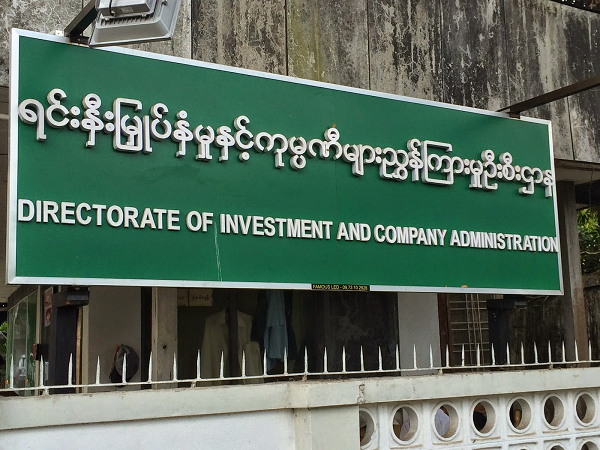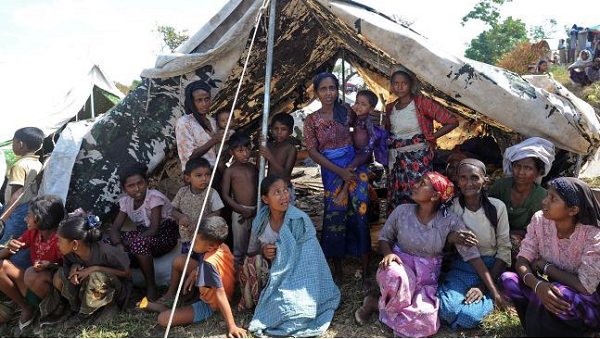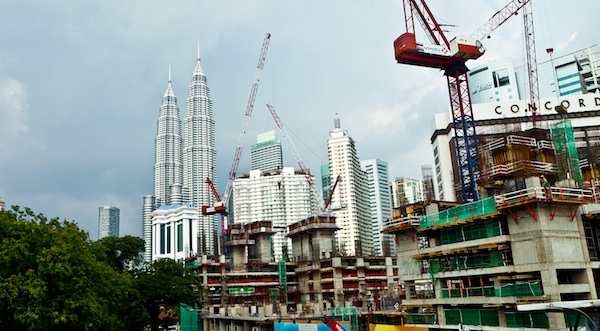
by Editor | May 25, 2021 | Business, Corporate, Corporate Buzz, Economy, Large Enterprise, News, Politics
 By Rupesh Dutta,
By Rupesh Dutta,
New Delhi : Aiming to strengthen India’s geo-strategic stand and transform the northeastern region into an economic powerhouse, the Centre has cleared a Rs 6,167 crore upgrade of a 352-km National Highway (NH) in Mizoram that will improve economic connectivity to Myanmar as also create an alternate trade route for mainland traders doing business in the northeast.
“The Aizawl-Tuipang NH is a major road development work at improving economic connectivity between Myanmar and India. This will also improve access to ASEAN markets for agro-processing, horticulture, dairy and fisheries, besides other industries based on the markets, availability of raw materials and other competitive advantages,” Nagendra Nath Sinha, Managing Director of National Highway Infrastructure Development Corporation (NHIDCL), which is executing the project, told IANS.
(The stretch between Tuipang and the Myanmar border is being executed by the Mizoram PWD under the supervision of the Union Ministry of Road Transport and Highways.)
Sinha, a 1987 batch Jharkhand cadre IAS officer, who recently became the NHIDCL head, said the project will receive funding of Rs 4,487 crore from the Japan International Co-operation Agency (JICA). The agreement for the first tranche of Rs 3,690 crore was signed in March 2017.
“NHIDCL is making advanced preparations for starting the work by taking up land acquisition activities in earnest,” he said, adding that the tender document for the upgrade has been readied and has been sent to JICA for approval “which is also expected soon”.
NHIDCL sources said the tender would be floated in the first week of September and the contract awarded by December.
The cost of civil works has been set at Rs 4,164 crore while Rs 520.45 crore has been earmarked for land acquisition, the sources said, adding that once the project becomes a reality, it will improve access to ASEAN markets for agro-processing, timber and bamboo-based industries among other goods.
Myanmar, the only southeast Asian country which shares a 1,643-km-long border with India, serves as a gateway to the other 10 member-states of the Association of Southeast Asian Nations (ASEAN). Four northeastern states — Arunachal Pradesh (520 km), Manipur (398 km), Nagaland (215 km) and Mizoram (510 km) — have an unfenced border with Myanmar.
Authorities at the Ministry of Road Transport Highways said the project is of utmost importance for Indo-Myanmar connectivity and environment clearance will be received by September before its tender is floated for bidding.
Environment clearance for the project is a must as 11.61 hectares of land for the highway is riverine reserve land.
Due to the hilly terrain and other difficulties, the government has set the construction cost at Rs 10-13 crore per km against the that of Rs 3.95 crore in the plains.
An expert on Indo-Myanmar affairs sees the project as a renewed commitment for the region’s socio-economic development, where roads have mostly been in a dilapidated condition for decades.
“The Aizwal-Tuipang highway should be seen as an achievement, if done within the time-frame. It is important that it is an all-weather road. We already have a Indo-Myanmar Friendship Road in Manipur but several sections are not usable throughout the year,” K. Yhome, Senior Research Fellow at the Observer Research Foundation, told IANS.
“This project will aim towards building a strong BIMSTEC (Bay of Bengal Initiative for Multi-Sectoral Technical and Economic Cooperation) community and strengthen strategy for India’s neighbourhood,” Yhome said, adding the project will also help in reaching business to the main areas of Mizoram and other states in the northeast, which too will result in the socio-economic development of the region.
(Rupesh Dutta can be contacted at rupesh.d@ians.in)
—IANS

by Editor | May 25, 2021 | World
 Nay Pyi Taw, (IANS) Myanmar will reduce tax on foreign investors in a bid to woo them to invest in less-developed regions, an official report said Thursday.
Nay Pyi Taw, (IANS) Myanmar will reduce tax on foreign investors in a bid to woo them to invest in less-developed regions, an official report said Thursday.
“Less developed regions in Myanmar could see an increase in investment if tax were to be reduced to make such business ventures more attractive,” the department of investment and companies said in the report.
The measure will be included in the new foreign investment law which is currently being drawn up, the department revealed.
Less developed areas cover Chin, Kayah and Rakhine states where primary requirements are basic housing and road infrastructure along with access to electricity which presents a special opportunity for potential investors.
The agricultural sector will be given priority to such investment, said officials of the department.
According to the Myanmar Investment Commission, over 80 submissions have been made to the commission so far during 2016-17 fiscal year by foreign and domestic companies intending to make investment in the country.
The year has attracted over $15 billion or 30.89 percent in the electricity sector and $37 million or 0.06 percent in the construction sector, statistics showed.

by Editor | May 25, 2021 | World
 YANGON: Myanmar and the United States appeared to agree to disagree on Tuesday on what to call the Southeast Asian nation’s beleaguered Muslim minority that Washington and most of the world know as Rohingya.
YANGON: Myanmar and the United States appeared to agree to disagree on Tuesday on what to call the Southeast Asian nation’s beleaguered Muslim minority that Washington and most of the world know as Rohingya.
Many Buddhists inside Myanmar prefer to call them “Bengalis”, arguing that the one million or so members of the minority are mostly illegal immigrants and not a native ethnic group. In fact, the families of many Rohingya have lived in Myanmar for generations.
US Ambassador Scot Marciel said the US calls communities by the name they themselves prefer.
“The normal US practice and the normal international practice is that communities anywhere have the right, or have the ability to decide what they are going to be called. And normally when that happens, we would call them what they asked to be called. It’s not a political decision, it’s just a normal practice.”
Because Myanmar does not officially recognise the Rohingya as an ethnic group, it denies most of them citizenship and basic rights. Conflict over land and resources in the western state of Rakhine, where most of the estimated 1 million Rohingya live, caused deadly violence between Buddhists and Muslims which later spread to other parts of the country.
More than 100,000 Rohingya were forced to flee their homes and now live in poor conditions in decrepit camps. Marciel declined to say whether, as reported, the country’s foreign minister and de facto leader Aung San Suu Kyi had personally asked him not to use the term. “I prefer not to publicly talk about private diplomatic conversations,” he said.Suu Kyi, who won international admiration and a Nobel Peace Prize for her non-violent struggle for democracy during Myanmar’s years of military rule, has in recent years disappointed many former fans by failing to speak on behalf of the Rohingya.
Despite international expressions of concern, Myanmar’s previous military-backed government, which handed over power this year to Suu Kyi’s National League for Democracy party, did nothing to ease the Rohingya’s plight. Myanmar foreign ministry official Aye Aye Soe acknowledged Tuesday that her office had asked Marciel not to use the term “Rohingya”.
She said Marciel has the right to call the minority whatever he likes, but calling them Rohingya could enflame communal tensions. “Yes, it is true that we told Ambassador Scot Marciel when he came to (Myanmar’s capital) Naypyitaw not to use the term ‘Rohingya’ because it is not supportive in solving the problem that is happening in Rakhine state,” said Aye Aye Soe, deputy director general of the ministry’s political department .
“And it can even worsen the situation there.” “This is his right to say or call whatever he wants, but this is not leading to a solution of the problems,” she said. “People are just fighting over this term instead of solving the problem. This can make things difficult for the two communities in Rakhine to gain trust again.”
A nationalist movement spearheaded by Buddhist monks has gained political influence by stirring up prejudice against Rohingya and Muslims in general.Last month Buddhist monks joined several hundred protesters outside the US Embassy in Myanmar to demand it stop using the term “Rohingya”.
The embassy had used the word earlier in a statement of concern about their situation after dozens died when a boat they were on capsized.
(Published in http://www.dawn.com)

by Editor | May 25, 2021 | Muslim World
Addis Ababa (IINA) – Special Advisor to the UN Secretary General on the Prevention of Genocide Adama Dieng on Tuesday accused Myanmar’s government of allowing discrimination to continue against the country’s Rohingya Muslim community and warned that it could lead to genocide.
“It was our hope that the new administration in Myanmar will address the issue of discrimination against the Rohingya who are Muslims. Instead, they have continued to be denied their identity,” Dieng told German Press Agency (DPA) in the Ethiopian capital of Addis Ababa, where he was attending a UN-sponsored meeting on the role of African religious leaders in preventing violence and extremism. “If it is not halted, it could lead to a genocide,” he added.
The Rohingya are a minority Muslim group in predominantly Buddhist Myanmar. The government does not consider them to be a native ethnic group but illegal Bengali immigrants, stripping them of their citizenship and property.
Dieng urged Myanmar’s State Counsellor Aung San Suu Kyi to use her moral authority to prevent discrimination against the Rohingya.
“Suu Kyi has asked the new US ambassador in Myanmar not to use the [name] Rohingya. This means the discrimination that this minority group faced for so many decades has continued,” he said.
Although Suu Kyi has been hailed for her pro-democracy activism in the past, she has recently come under criticism over the situation of the Rohingya, whose population exceeds one million.

by Editor | May 25, 2021 | World
 Nay Pyi Taw, (IANS) Myanmar has targeted $8 billion foreign investment in the present fiscal year of 2016-17, the Directorate of Investment and Company Administration announced on Monday.
Nay Pyi Taw, (IANS) Myanmar has targeted $8 billion foreign investment in the present fiscal year of 2016-17, the Directorate of Investment and Company Administration announced on Monday.
The country drew $9.5 billion foreign investment in the last fiscal year of 2015-16 which ended in March, Xinhua news agency reported.
Myanmar received $1.413 billion foreign investment in 2012-13, $4.107 billion dollars in 2013-14 and over $5 billion in 2014-15, the directorate said.
According to official statistics, foreign investment in Myanmar totalled to $63.718 billion as by the end of March after a gap of over 27 years.
Foreign investment during former president U Thein Sein’s previous five-year government term from 2011 to 2016 created over 350,000 job opportunities.
The Myanmar Investment Commission has been encouraging more foreign direct investment in trade, agriculture and infrastructure in order to speed up the country’s economic development and create more job opportunities.





